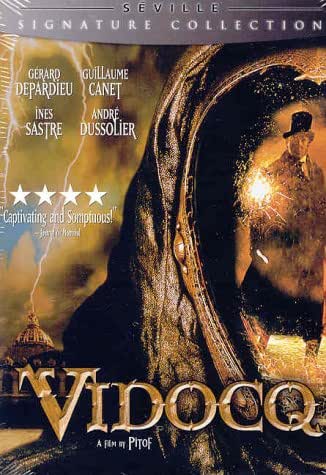*½/**** Image B Sound B Extras (see review)
starring Gérard Depardieu, Guillaume Canet, Ines Sastre, André Dussolier
screenplay by Jean-Claude Grange
directed by Pitof
by Bill Chambers Bona fide criminologist Eugene Francois Vidocq has been the subject of several films, including Douglas Sirk’s little-known A Scandal in Paris. What makes him ripe for mythologizing is his pre-detective career as a thief: he’d learned the streets so well as one of their own that he knew which rocks to turn over in his police work. Among his achievements as a purported inspiration for Sir Arthur Conan Doyle’s Sherlock Holmes, master of disguise Vidocq pioneered the science of ballistics and founded the first detective agency. Little biographical detail finds its way into Francophone director Pitof’s anti-biopic Vidocq, but a cursory knowledge of the gumshoe’s legacy can’t hurt. You may otherwise find yourself doubting the layout of Vidocq’s office–which suggests Sam Spade’s circa 1830–or his talent for slipping in and out of corners unnoticed, even though he’s portrayed by the unmistakable Gérard Depardieu.
Not that Vidocq is plausible besides. In Pitof’s CGI Paris, the city is being terrorized by a cloaked monster able to steal souls with his mirrored mask, a theme that lacks resonance here despite its deep roots in Japanese folklore (or Nietzsche, if you prefer); Pitof sees it only as a springboard for an interesting visual. Hired to uncover the identity of this fiend, Vidocq does so in the opening scene, just prior to plunging into an infernal abyss. Enter his young “official biographer” Etienne (Guillaume Canet), reminding of the Thompson character from Citizen Kane. Etienne interviews friends, lovers, and mere acquaintances of Vidocq hoping to discover for himself the last face that Vidocq saw.
Pitof began his career shooting softcore pornography for cheap and then gussying it up in post to create the illusion of production values. Not much has changed in the two decades since: The holes in Jean-Christophe Grange’s screenplay would’ve really shown through had it been approached in an unembellished style, yet Pitof’s swooping, busy frame is so numbing that we become attentive to the problems of the script, anyway–it’s the secret message you start hearing in white noise. (Most problematically, the revelation of the killer accidentally subverts Vidocq’s investigative genius in the name of a drawing-room climax.) Vidocq is a spastic audition reel for a Hollywood career; similar to one-named auteurs McG (Charlie’s Angels) and Tarsem (The Cell), Pitof uses the camera like an Etch-a-Sketch savant, hastily discarding one flashy image after another. Alas, he leaves the audience feeling like an Etch-a-Sketch: shaken mercilessly. It’s not a pleasurable sensation.
THE DVD
Filmed using a combination of HD, SD (Standard Definition), and mini-DV cameras, Vidocq reflects this in a Canadian import DVD from Séville of inconsistent video quality. The 1.85:1 anamorphic widescreen transfer looks as glorious, on occasion, as the all-digital Attack of the Clones (you’ll swear you’re watching a celluloid source during some scenes), but often the image is plagued by halos and other tape-to-film-to-tape artifacts. Too, the picture suffers from mild strobing for which a PAL-to-NTSC conversion might be responsible. The Dolby Digital 5.1 French track applies Phil Spector’s wall-of-sound to a feature-length thriller–it’s a bombastic mix absent of a certain finesse. While Séville has outfitted Vidocq and its trailer with optional English subtitles for their “Signature Collection” DVD, the same is not true of the disc’s bonus material; unless you understand French (and I don’t), you’re not going to get a lot out of Vidocq‘s supplements.
“Equisses des personnages” is a step-frame gallery of the creature and costume designs by (former Jean-Pierre Jeunet collaborator) Marc Caro and Fabien Esnard-Lacombe, respectively; French comprehension is irrelevant here and in the “Galerie d’affiches,” an archive of Vidocq poster concepts. Clicking on “Vidéoclip” leads to the video for a piece of driving Euro-pop by Apocalyptica, and after that is where things get tricky: “Documentaire sur les scénarimages” (20 mins.) asks and presumably answers the question, “Le storyboard, une nécessité?”; “Documentaire sur les effets spéciaux” (7 mins.) deconstructs a few of the bluescreen-heavy sequences; “Entrevue avec les réalisateur” sits down with Pitof for 40 minutes; “Documentaire sur le tournage du film” (6 mins.) appears to be an EPK-style featurette; and in “Entrevue avec Jean-Claude Grange” (19 mins.), we hear from the screenwriter. An unsubtitled French commentary from Pitof, a page of DVD credits, and Vidocq‘s theatrical trailer round out the disc.
98 minutes; R; 1.85:1 (16×9-enhanced); French DD 5.1; CC; English subtitles; DVD-9; Region One; Séville




![The Spider Woman|The Voice of Terror [Sherlock Holmes Double Feature] - DVD The Spider Woman|The Voice of Terror [Sherlock Holmes Double Feature] - DVD](https://i0.wp.com/filmfreakcentral.net/wp-content/plugins/contextual-related-posts/default.png?resize=150%2C150&ssl=1)

